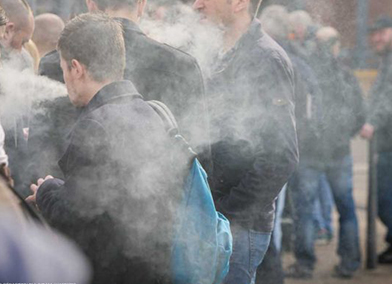The California Department of Public Health (CDPH), has been carrying out air sampling in vape shops throughout the state, as part of its initiative to determine the health effects of second-hand vapor exposure.
Earlier today in his blog, Public Health Expert Dr. Michael Siegel pointed out that the results for this report were obtained from a relatively small and non-ventilated vape shop, where many of the employees and 13 customers were actively vaping while the sampling was taking place, hence what would be considered a situation presenting a high level of exposure to second-hand vapor. However, given all these unfavourable conditions, the results still reported no dangerous levels of exposure to any hazardous chemicals.
The main results of the air sampling go as follows :
• Nicotine: Not detected
• Glycidol: Not detected
• Formaldehyde: 7.2 ppb
• Diacetyl: Not detected using standard method
• 2,3-Pentanedione: Not detected using standard method
• Acetyl butyryl: Not detected using standard method
• Acetoin: Not detected using standard method
• Acetone: Not detected
• Ethyl benzene: Not detected
• m,p-Xylene: Not detected
• o-Xylene: Not detected
• Toluene: Not detected
• Acetaldehyde: Not detected
• Acetonitrile: Not detected
• alpha-pinene: Not detected
• Benzene: Not detected
• Chloroform: Not detected
• d-Limonene: Not detected
• Methylene chloride: Not detected
• Methyl methacrylate: Not detected
• n-Hexane: Not detected
• Styrene: Not detected
Finally putting fears about formaldehyde to rest?
Dr. Siegel pointed out that the level of formaldehyde detected, is consistent with the levels normally found in indoor and outdoor air levels under baseline conditions, adding that the only other chemicals detected were ethanol (alcohol) and isopropyl alcohol.
“This study, although conducted under very high exposure conditions in a small, non-ventilated vape shop with many employees and customers vaping and clouds of vapor visible, did not document any dangerous levels of exposure to any hazardous chemical. Nicotine exposure was essentially non-existent. Formaldehyde exposure was no different than in many indoor and outdoor environments at baseline. Acetone, acetoin, other aldehydes, toluene, benzene, and xylene were not detected. Chemicals that have been associated with “popcorn lung” were also not detected by the standard method.” stated Siegel.
No justification for governments to ban vaping
“This study adds to the evidence that under real-life conditions, secondhand vaping does not appear to pose any significant health risks.” concluded the public health expert. He added that whilst he himself has been behind many of the smoking bans that took place, based on this current evidence he fails to see a reason as to why governments should ban vaping in public spaces. “With regards to vaping, I just don’t see any reasonable evidence at this time that it poses any significant health hazard to bystanders.”


